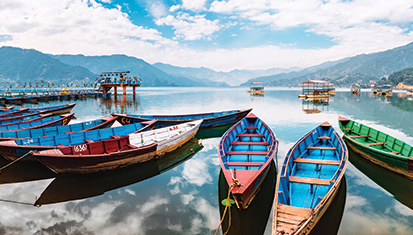A roadmap to post-COVID recovery for Nepal’s agri and tourism SMES
A roadmap to post-COVID recovery for Nepal’s agri and tourism SMES
Small and Medium Enterprises (SMEs) in Nepal are crucial to the country’s economic growth, creating 2.36 million jobs and contributing to 22% of the country’s GDP. SMEs operating in the agricultural and tourism sectors are acutely suffering from the economic fallout of Covid-19.
As the lockdown in Nepal gradually lifts, Ecorys and Nathan Associates update our earlier analysis of these sectors from a 2018-19 DFID private sector development programme, and recommend a possible path to recovery for Nepal’s agri and tourism SMEs.
Economic Impacts for Agriculture and Tourism
Nepal’s projected growth has dropped from 7% to just 2.5% during the Covid crisis, due to slowed regional and domestic demand, a nosedive in remittance income, a complete standstill in tourist arrivals, and shrinking domestic and global investment. The ripple effects can be felt through every sector and tier of Nepal’s economy.
Agriculture and tourism both significantly drive Nepal’s GDP, provide large sources of employment, and represent high current and future potential for SMEs. The four-month nationwide lockdown brought tourism to a complete standstill, derailing the planned ‘Visit Nepal 2020’ campaign, and saw Nepal’s agricultural sector suffer from significant market disruptions and difficulties moving agricultural products. Key impacts on each sector include:
Agriculture:
- Disrupted demand for agricultural goods and products
- Disrupted supply chain, particularly for logistics and other supporting services
- Reduced capital flows in a sector already facing significant financing gaps
Tourism:
- A standstill in demand for tourism goods and services given border closures to international travellers and restrictions on domestic movement
- Widespread closure of tour operators, tea houses and small hotels, and large scale job losses across the sector
- Reduced capital flows in a sector with limited retained earnings to weather economic shocks
Opportunities for Post-Covid Recovery for Agri and Tourism SMEs
With the recent lifting of Nepal’s lockdown, it will be important to support key sectors towards economic recovery in a manner to crowd in investment and bolster trade in transformative growth sectors like agriculture and tourism. Ecorys and Nathan Associates have updated a 2018/19 analysis of these two key sectors in Nepal and provide key recommendations for supporting Nepali agri and tourism SMEs to survive in the wake of the Covid-19 crisis in support of:
- Adaptability: the ability to use market information to pivot, manoeuvre systems, processes and accessibility to get products to their consumers
- Linkages: understanding the market and adapting their production to new realities
- Liquidity: ability to ensure cashflow despite reduced revenue from the drop in tourist numbers.
Although the recent fiscal budget laid out an ambitious platform for investing in Nepal’s economy, specific policies and incentives to businesses will need to be provided so that Nepal can capitalise on every opportunity to bounce back quickly from the economic fallout of Covid-19, and reposition itself in sectors with transformative economic potential.
The Covid-19 crisis will require a redoubling of effort from the government and private sector to support adaptability, linkages and liquidity for SMEs in the agri and tourism sectors. This will likely require closer dialogue between the private sector and the Government of Nepal – supported by development partners and DFIs – for years to come, to ensure what works is promulgated across these sectors, and that fit-for-purpose regulatory frameworks are in place to attract investment and tourists.
The PDF version of our full analysis can be found here. For questions please contact Jessica.Sinclair@Ecorys.com or ERussell@Nathaninc.com

19 August 2020
3 minute read


